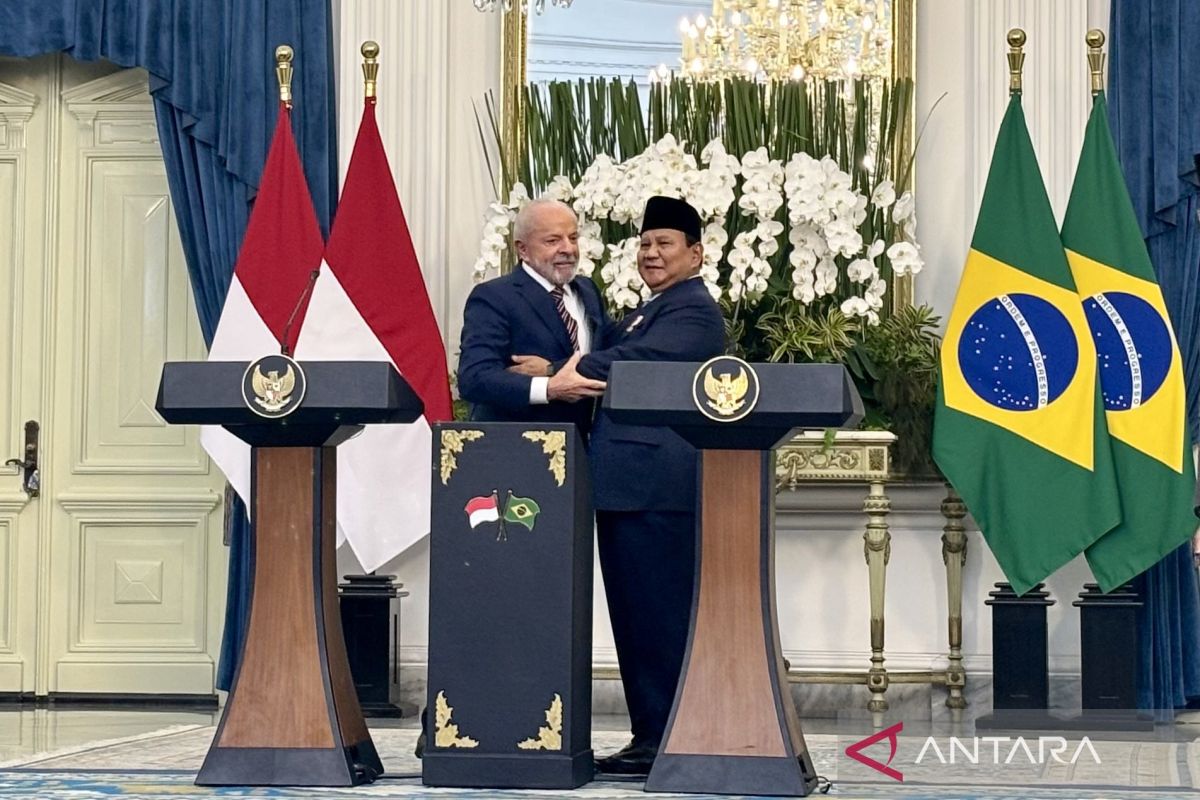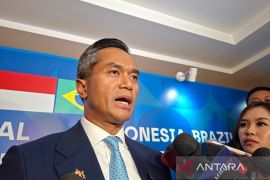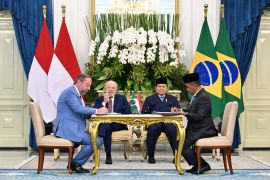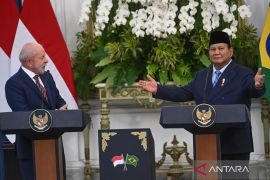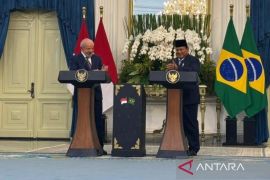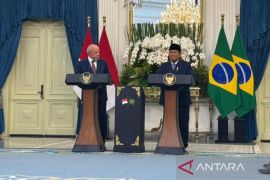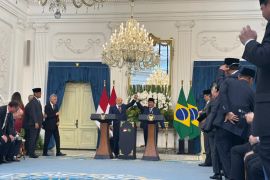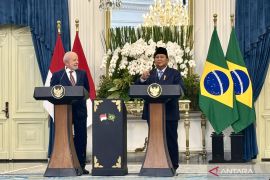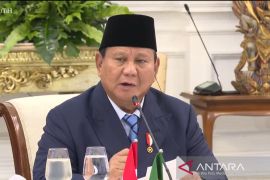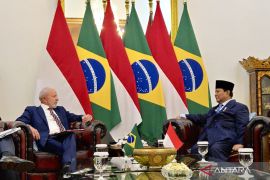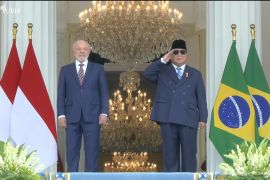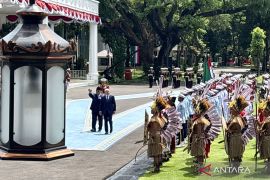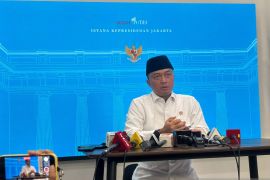Seventy-two years into their diplomatic relations, Indonesia and Brazil continue to forge new avenues for even deeper collaboration. This trend is reflected in the respectful personal rapport between Prabowo and his Brazilian counterpart, Luiz Inácio Lula da Silva, demonstrated on multiple occasions.
During their recent encounters in Brazil and Indonesia, Prabowo and Lula reaffirmed their commitment to advancing bilateral ties and explored opportunities for multifaceted cooperation in trade, agriculture, social welfare, defense, and other key sectors.
Beyond bilateral ties, Indonesia's diplomacy has aligned with Brazil's multilateral leadership on three major fronts: BRICS, the New Development Bank (NDB), and Mercosur. President Lula currently leads both BRICS and Mercosur, while his political ally Dilma Rousseff chairs the NDB.
BRICS for shared priorities
Prabowo and Lula have leveraged Brazil's BRICS presidency in 2025, during which Indonesia gained full membership alongside Russia, India, China, South Africa, Egypt, Iran, Saudi Arabia, and the UAE — marking one of the most significant diplomatic milestones of Prabowo's administration.
Indonesia's accession to the alliance in January 2025 injected new momentum into its enduring partnership with Brazil. As emerging leaders of the Global South, both countries are harnessing their strategic alignment to shape a more inclusive and equitable global order.
This move also reflects Prabowo's ambition to elevate Indonesia's role in multilateral forums and aligns with Brazil's push for reform in global governance.
To assert Indonesia's aspiration for a greater global role, Prabowo in early July flew to Rio de Janeiro to directly represent Indonesia at the 17th BRICS Summit, marking the country's inaugural appearance in such a forum since becoming the 11th member of the group.
Opening the high-level conference, Lula welcomed Indonesia and Prabowo, who was the sixth to speak. Prabowo urged BRICS members and the global community to revive multilateralism amid rising unilateralism, tense geopolitics, and growing trade rivalries.
Prabowo criticized the growing trend of powerful countries using their advantages as tools of coercion in international relations — a firm statement later praised by Lula during their bilateral meeting in Brasília.
The Brazilian president echoed the view, rejecting the dominance of superpowers in shaping the world order. He said BRICS was created to counter such unilateralism, embodying the non-aligned vision promoted at the 1955 Asian-African Conference in Bandung, Indonesia.
The strengthening of multilateralism and the call for reform in global governance were among the key points put forward in the Rio Declaration adopted by BRICS members during the summit.
Prabowo also used the international forum to rally BRICS members toward accelerating the transition to clean energy to combat climate change and establishing an initiative called the South-South Economic Compact as a platform for Global South countries to foster stronger, mutually beneficial trade and economic ties.
On September 8, the Indonesian head of state once again affirmed Indonesia's presence by taking part in the BRICS Leaders' Virtual Meeting, where he reiterated his commitment to bolstering partnerships with BRICS members and hailed Lula's leadership in the multilateral bloc.
Toward NDB membership
Only three days after taking his oath of office in October 2024, Prabowo directed Indonesia to engage the NDB, a financial institution created by the founding members of BRICS. Under his command, Foreign Minister Sugiono held bilateral talks with NDB Chair Dilma Rousseff, the former Brazilian president and Lula's close ally in the Workers' Party.
At the meeting held during the BRICS Plus Summit in Russia on October 23 last year, Sugiono briefed Rousseff on various strategic programs prepared by the Prabowo administration. Both parties agreed that many of the programs align with NDB funding initiatives aimed at combating inequality.
Rousseff encouraged Sugiono to guide Indonesia toward joining the NDB — an invitation she reiterated during her visit to Jakarta on March 25, when she was received by President Prabowo and Coordinating Minister for Economic Affairs Airlangga Hartarto.
At a joint press conference with Rousseff at the Merdeka Palace, Prabowo announced his decision for Indonesia to follow all procedures and meet the requirements to pursue membership in the NDB. He also commended the former Brazilian president for her tenacity in encouraging Indonesia to join the bank.
Investment Minister Rosan Perkasa Roeslani reported that the NDB is eager to financially support Indonesia's clean energy and infrastructure projects.
Unlocking the Mercosur pact
After wrapping up his agenda at the 17th BRICS Summit on July 6–7, President Prabowo continued his engagements in Brazil with a visit to the Planalto Palace in Brasília, where he exchanged views on various fields with President Lula.
He sought Lula's support to advance the long-delayed comprehensive economic partnership agreement (CEPA) between Indonesia and Mercosur, a trade bloc with a combined GDP of over US$2 trillion and 260 million people. Lula had recently assumed its rotating presidency.
Although the CEPA was officially launched in 2021, negotiations had yet to commence due to unaddressed differences among Mercosur members: Brazil, Argentina, Uruguay, and Paraguay.
Noting the stagnation, Prabowo reiterated the need to advance CEPA talks during his October meeting with Lula at the Merdeka Palace, expressing confidence that the deal would spur economic growth in Indonesia, Brazil, and across South America.
The two nations agreed to pursue the immediate commencement of negotiations.
Two key encounters
The multilateral alignment took shape through two key meetings — President Prabowo's visit to Brasília in July and President Lula's trip to Jakarta in October — which strengthened bilateral ties and aligned both nations' positions on regional and global issues.
At the Planalto Palace in Brasília, Prabowo and Lula exchanged views on various shared issues, including public health and hunger alleviation. The Indonesian president acknowledged that his Free Nutritious Meals (MBG) program was modeled after Brazil's school-feeding initiative, the Programa Nacional de Alimentação Escolar (PNAE).
Lula, in turn, praised MBG as one of the world's largest school meal initiatives and expressed Brazil's readiness to support its implementation in Indonesia, where it has reached about 37 million people nationwide.
Highlighting Indonesia's food security efforts, Prabowo announced plans to dispatch experts and professionals to Brazil to learn from its experience in agricultural innovation and technology — a move welcomed by Lula.
The Indonesian president also reaffirmed his commitment to expanding defense cooperation, citing plans for joint military exchanges and the co-development of missile systems and submarines.
Additionally, the Brasília meeting resulted in both countries agreeing to step up ties in the economy, education, trade, investment, and energy sectors.
Building on the momentum from their July meeting, Prabowo and Lula reunited at the Merdeka Palace in Jakarta on October 23, translating shared aspirations into concrete bilateral instruments. This trip marked Lula's second visit to Indonesia since 2008.
During a one-on-one meeting, the Brazilian president advocated for renewing the multifaceted bilateral strategic partnership established during his first visit to Indonesia in 2008.
To this end, he urged broadening cooperation in the economy, political affairs, and science, as well as in emerging fields such as artificial intelligence, data centers, and inter-university relations. He also expressed confidence that deeper ties would boost bilateral trade volume to exceed US$6 billion.
Prabowo, for his part, noted that he and Lula had engaged in prolific meetings and discussions over the past few months, emphasizing that Indonesia and Brazil have agreed to further strengthen collaboration in trade, agriculture, technology, education, research, and defense, among other key sectors.
Moreover, he conveyed plans to begin teaching Portuguese in Indonesian schools as a gesture of appreciation for Brazil's strategic value to his country.
The two leaders exchanged compliments throughout the meeting, highlighting each other's domestic, regional, and global initiatives.
Following the meeting, both leaders witnessed the signing of eight memorandums of understanding between government agencies and businesses, covering cooperation in energy transition, technology development, sanitary and phytosanitary standards, statistics, food processing, oil and gas, as well as trade and investment.
Indonesia and Brazil have built a solid foundation for deeper cooperation — bilaterally and multilaterally. With shared priorities now backed by concrete agreements and strategic trust, both nations are well-positioned to turn vision and aspirations into lasting impact and shared progress.
Related news: Indonesia, Brazil chart path toward energy and mining growth
Related news: RI, Brazil agree to start RI-Mercosur CEPA negotiations soon: Prabowo
Reporter: Tegar Nurfitra
Editor: Anton Santoso
Copyright © ANTARA 2025
